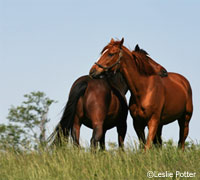
“Sweet…”, as a modern term, denotes pleasure and enjoyment. However, for a horse, sweet itch can be anything but “sweet…”.
“Sweet Itch, also known as summer eczema or equine dermatitis, is one of several seasonal allergies that your horse may encounter,” notes Dr. Glennon Mays, clinical associate professor at the Texas A&M College of Veterinary Medicine & Biomedical Sciences.
“Equine dermatitis can have varying causes,” explains Mays. “Allergens may irritant your horse’s skin, but viruses and bacteria may also manifest themselves as dermatitis. These foreign agents can cause inflammatory conditions in the skin and may affect your horse’s hair coat. Equine sweet itch is a seasonal allergic skin condition that can be caused by fly bites or midge bites. Horses that suffer from sweet itch have developed an allergy to these bites.”
Insects flourish in the summer and horses may have sensitivities to insect bites, notes Mays. In particular, black flies, known as buffalo gnats, can seek horses as hosts. These flies feed on the blood of mammals and are attracted to hosts by smell, heat and sight. They prefer the host’s head, hair and ears but will also bite any skin that is exposed.
“The female black flies are blood feeders,” explains Mays. “The fly bites by cutting into the skin and feeding on the pooled blood. Anticoagulants injected into the feeding sight cause an allergic reaction.”
Black flies feed during the day, so stable animals during the day when fly populations may be more abundant. Fly repellents applied to the chest, belly and ears can be effective if applied daily, says Mays. Cloth coverings fitted over horses’ ears may be used for additional protection. Coverings may also be used to protect your horse’s eyes and head.
“Allergic dermatitis can result from the black fly bite,” states Mays. “Antigens in their saliva can cause allergic reactions. Additionally, the black fly bite can become painful and itchy as blisters form. Therefore, protecting the face and ears from flies eliminates a major source of irritation for your horse.”
Equine dermatitis will usually result in symptoms such as scratching, biting affected area, crusts, hair coat damage or loss, flaky dandruff and thickened skin, explains Mays. The itchy skin can be further irritated when the horse rubs the area (on fences or stalls) to the point of hair loss and scabbed skin. This is when secondary bacteria can enter the skin and cause infection.
“Sweet itch is commonly seen in 4 to 6 year old horses,” notes Mays. “Repeated exposure to the allergen, in this case, fly bite, is required for the allergy to develop.”
To help reduce the incidence of sweet itch, begin preventative measures before fly season is in full force, suggests Mays. Use a fan in your horse’s stall. The constant airflow deters flies from lighting and biting. If possible, place fine-mesh screens over barn openings to prevent flies from entering stalls. Install automated insecticide mist systems to help control fly populations. Consult your local veterinarian for the best insecticide to use in your stables and on your horse.
Black fly, stable fly, horse fly and midge bites all can cause allergic skin reactions in horses. Corticosteroids are the most useful treatment for controlling these skin allergies, notes Mays. This anti-inflammatory helps stop the itching so that the skin can heal. However, there may be steroid side-effects in horses, so they must only be prescribed by your veterinarian.
If your horse has an annual encounter with summer sweet itch, help him to manage the itch by taking preventative measures to lessen the severity of an annoying allergy.





Sounds horrible!
My horses get bites across their chest in a row, that looks like they cut themselves on barbed wire, but the sand mites do this.
SOUNDS MISERABLE. I LIKE TO APPLY FLY SPRAY EVERY DAY, EVEN IF THE BOTTLE SAYS UP TO 14 DAYS. YEA RIGHT. I FOCUS ON LEGS, STOMACH AND SHEATH AREA, AND FACE. IT SEEMS IF I TRY TO COAT THEIR BODIES DOWN, THEY GO ROLL IN THE DUST AFTER I APPLY! (ARGH!) IM USING FLY ELIMINATORS FOR THE FIRST TIME THIS YEAR. I GUESS THEY ARE WORKING, BECAUSE SO FAR, WE DONT HAVE A TON OF FLIES AROUND THE BARN. IF THE FLY POPULATIONS STAYS DOWN FOR THE REST OF THE SUMMER, I WILL BE ORDERING THOSE ELIMINATORS FOR SURE NEXT SPRING!
interesting
Great info! Thanks!
we have a horse that got bit by a horse fly and has bumps on her body. We are putting lots of fly spray on her. I have another horse who is allergic to fly spray and I know this, so I put lots of fly protection on her such as sheets and masks. This was a great article though.
My Horse is already showing severe sweet itch, I have tried alot and the one thing that is working is Pyranha fly spray on him, its almost gone away…. I spray him almost daily if not every other day..
Those pesty flies and nats. i put on horse fly spray it works but not for a long time.and i bought a new kind of horse fly spray and it takes all flys away and kills them for good i am happy about it. and when i am cleaning my horses hoof the horse is not kicking at me. the horse is kicking at the flys. becase the flys are bothering her we took care of it shes fine now me and the horse are safe.:]